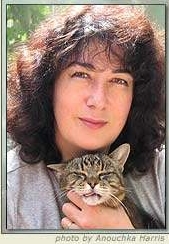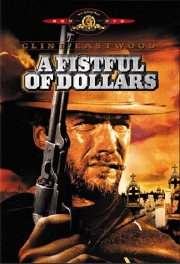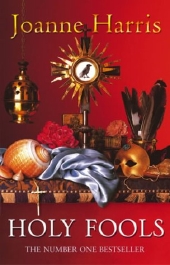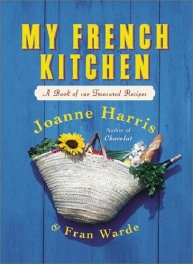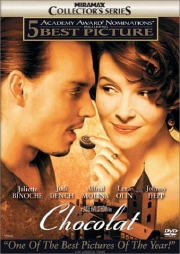Food,
Magic and Westerns
The Novels of Joanne
Harris
The Agony Column for December
30, 2003
Commentary
by Serena Trowbridge
|
|
|
| Joanne Harris and friend. |
Reading her five novels to date, Chocolat, Blackberry Wine, Five Quarters of the Orange, CoastLiners and Holy Fools (in that order) it is true that they have elements in common – a gentle naïveté which is reminiscent of fairytales (although with their fair share of cynicism in certain characters), and a tendency for the cynics to be brought into line with a certain touch of magic and mystery.
Appropriately, therefore, when I went to hear Joanne Harris speak as part of the Birmingham Book Festival, in an event hosted by Debbie Taylor from Mslexia, the magazine for women who write (www.mslexia.co.uk), Ms Harris commenced her talk by emphasising the importance of fairytales. Ms Taylor asked about the importance of magic and the occult in her novels, and Ms Harris explained that she has always had a love of “unexpurgated fairytales”, the kind that make you want to get closer to the fire on a dark night, where the unexplained elements of magic and mystery are a dark unnamed presence at the back of the story. She has frequently gone to the Grimm tales for inspiration and is fascinated by folklore and use of the occult. She also admitted that although frequently described as a writer of magic realism, she has never been quite sure what it is. Asked if she believed in it, she said that her upbringing was by superstitious family well versed in folklore, and that and living in a haunted house has brought her to an understanding, if not quite a belief, in magic and the occult.
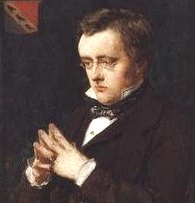 |
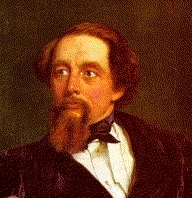 |
|
Wilkie Collins (left) and Charles Dickens (right), respected practitioners of Gothic literature, inspirations to us all and Joanne Harris in particular. |
|
This inspired her in what she refers to as her previous life as a writer, to endeavour single-handedly to revamp the genre of gothic romance, which resulted in the publication of two novels, The Evil Seed and Sleep Pale Sister. Her publishers are intending to reprint the latter (to Harris’s embarrassment) and I hope to review a copy if and when they succeed. These have what her publishers described as a cult following, which she takes to mean two fans in Clapham who write a lot of letters! She has always avidly devoured this kind of reading matter, and felt that it was a pity that while it was once a highly respected literary genre, undertaken by the likes of Wilkie Collins, Dickens, Walpole and Mary Shelley, even dabbled in by Jane Austen, it has fallen from the literary genre in recent years to become a cult fiction that is not considered mainstream or of literary value. When her novels appeared, however, she now suspects that her timing was bad and that now is perhaps a more suitable time for this kind of revival. Initially these titles were also published with misleading covers, says Ms Harris, and consequently didn’t do well. It will be interesting to see how many more people are interested now that she is a household name.
|
|
|
| We'd all like a fistful of dollars. |
Another important influence on her writing has been Westerns, which might come as a surprise to her readers, but the shocking news is that she believes (with good reason) that the plot of Chocolat is the same as that of A Fistful of Dollars. Simple plots work best, she added, especially combined with an element of fantasy, and certainly the success of her novels lies partly in that they are character-driven rather than plot driven.
Her latest novel, Holy Fools, was discussed in detail, and she is clearly pleased with her work. She describes it as the novel of “the dancing nuns”, and explained that it took her six years to write, during which time her other four famous novels hit the bestseller lists, but this book is more of a return to the gothic fantasy she always wanted to write. Despite confessing that she dislikes research (and admitting jealousy of Margaret Atwood’s alleged eight researchers!) her knowledge of fifteenth century France is impressive. A large part of her talk was filling in the background of the historical details, which was fascinating. Holy Fools is the tale of a young woman who has taken refuge in a nunnery and finds herself in trouble there when a twelve-year-old abbess takes over and hysteria sweeps the nuns.
|
|
|
Joanne
Harris does dancing nuns in her latest novel.
|
She may have been labelled as a writer of novels that are French, foodie, gothic etc, but she prefers to change her style and themes frequently as she is easily bored and likes to diversify, although her publishers were apparently hoping for another book about food. To her, though, writing is not a proper job, nor about making money, but about having fun, playing with ideas and words and doing what one wants, and she loves that it keeps her taking risks. Writing, she says, is like the red shoes; once you start writing it’s impossible to stop, and she frequently gets her inspiration from the other books she reads, such as Hans Christian Anderson, which she finds quite scary but full of material.
|
|
|
| The literary equivalent of fine French Cuisine. |
When asked what she reads, I was interested to find out that she does a fair amount of reviewing herself, and is currently strongly recommending 'The Man Who Ate the 747' and 'The Death and Life of Charlie St Cloud', which was absolutely a feel good novel, (she said with a twinkle in her eye) and should be a huge success. She also loves Lemony Snicket, which she says is very gothic. Her introduction to this was from reading it to her young daughter, who loves it, and Joanne is hooked herself now, she said with an amusing lack of pretentiousness.
|
|
|
No
food was harmed in the making of this movie.
|
She still feels that writing is not a proper job, as her mother told her – akin to being a lion tamer. As her mother was convinced that being a writer would involve dying alone and syphilitic, she became a teacher, and kept writing in secret until the publication of Chocolat, when the secret was out!
As a nice end to the evening, when I asked her to sign a book for me, she asked my name and told me that she had once written a story about a girl called Serena and a bank manager who turned to crime!
You can find out more about Joanne Harris’s work at www.joanneharris.com (US) or www.joanne-harris.co.uk (UK – personal homepage).
